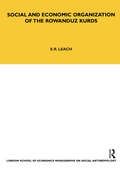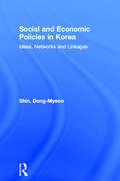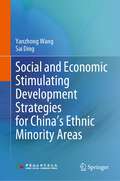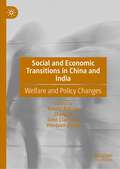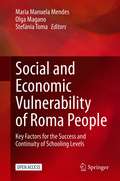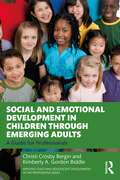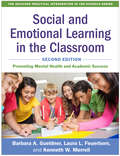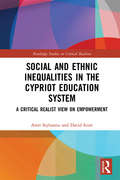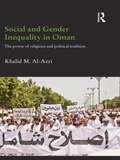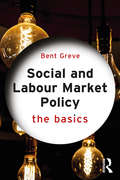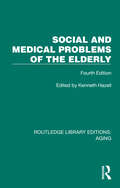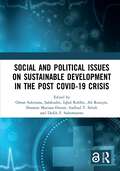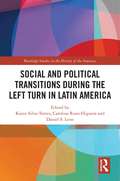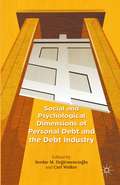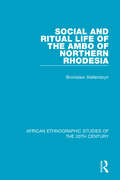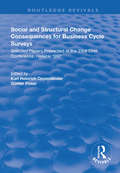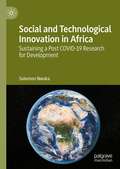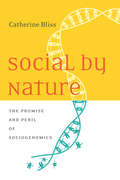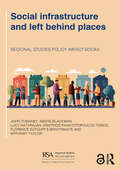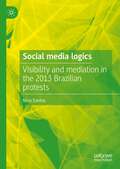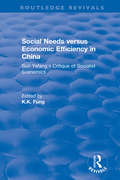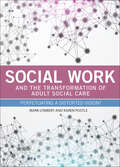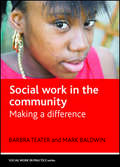- Table View
- List View
Social and Economic Organization of the Rowanduz Kurds
by Edmund LeachInitially published in 1940, the following account is based upon a five weeks field survey carried out during the summer of 1938 in Iraq. The author intended to follow this up with an intensive study of one locality over a period of twelve months. Political developments in Europe made this project impracticable at the time and the scheme was abandoned.
Social and Economic Policies in Korea: Ideas, Networks and Linkages (Routledge Advances in Korean Studies)
by Dong-Myeon ShinThe sustained remarkable economic growth in the East Asian countries - Japan, South Korea, Taiwan, Hong Kong and Singapore - has brought about a great deal of debate over the role of the state in the market and society. Shin analyses the dynamic process of state interventions in the economy and social affairs in Korea from the early 1960s until the present with special reference to five policy areas: macro-economic policy, industrial policy, social security policy, labour policy, and education and training policy.Social and Economic Policies in Korea develops a unique explanation about the development of Korean social policy using the concepts of 'policy idea', 'policy network', and 'policy-linkages' to examine the causes, patterns and consequences of state interventions in the economy and social affairs over time. It should interest students and researchers of East Asian studies, social policy and development studies.
Social and Economic Stimulating Development Strategies for China’s Ethnic Minority Areas
by Yanzhong Wang Sai DingThis book gathers the outcomes of various, extensive research efforts on building a moderately prosperous society in minority areas, which would allow China’s poor and poverty-stricken areas to comprehensively join the rest of society. Offering an essential reference guide, the book will help readers understand the process, achievements, problems, and future development with regard to building a moderately prosperous society in the new era.
Social and Economic Transitions in China and India: Welfare and Policy Changes
by John Clammer Keerty Nakray Zhang Yi Wenjuan ZhangThis book conducts a comparative analysis of social and economic changes in the welfare state transformations in China and India, at national and sub-national levels. Discussions are made based on impacts from the social and economic changes in the last century and the fourth industrial revolution on welfare state transformations in China and India, the world's two largest countries in terms of population and density.First-hand empirical work is conducted by a group of scholars from India and China, which draws on inter-disciplinary and cross-cultural academic traditions to deepen social, cultural and legal understanding between the two countries.This book would appeal to undergraduate and graduate students in comparative sociology, political science, law and comparative welfare studies as well as researchers in these fields, as well as researchers in policy think-tanks and research institutes and officials in government and non-governmental organizations.
Social and Economic Vulnerability of Roma People: Key Factors for the Success and Continuity of Schooling Levels
by Maria Manuela Mendes Olga Magano Stefánia TomaThis open access volume provides an understanding of the different aspects of success, school continuity and social mobility among European Roma, including the motives justifying the high rates of school dropout and failure among this group. It offers a critical and reflexive perspective about social reality from a multidisciplinary and transversal point of view, sharing knowledge and practices in different countries about the articulations between Roma families, individuals, school and public policies. Over time, there has been an increase in the educational attainment of European citizens, but there are still persistent inequalities between Roma and non-Roma, including gender inequalities, which greatly affect Roma women. The volume explores the issue of Roma education and includes chapters from Western European, South and Central and Eastern European researchers using different theoretical and methodological perspectives. The intersection of this diversity and plurality of standpoints makes possible to obtain a comprehensive view on the education and schooling of European Roma.
Social and Emotional Development in Children through Emerging Adults: A Guide for Professionals (Applying Child and Adolescent Development in the Professions Series)
by Christi Crosby Bergin Kimberly A. Gordon BiddleThis concise guide offers an introduction to how children and young people develop social and emotional competence, and how they display appropriate social behavior and emotional expression at different ages.Explaining the role of adults in a range of contexts and settings, this volume offers strategies for supporting competence and highlights key topics, such as attachment, prosocial behavior, social perspective taking, ethnic identity, social and emotional learning, gender identity, parenting styles, and much more. Moving through the different ages of childhood to emerging adulthood, the authors detail social and emotional development and the development of the self. They also offer strategies to foster social–emotional competence through these different ages.Social and Emotional Development in Children through Emerging Adults is designed for students and professionals in psychological, educational, health and social work settings who want to support and nurture children and young people to ensure their needs are met.
Social and Emotional Learning in the Classroom: Promoting Mental Health and Academic Success (The Guilford Practical Intervention in the Schools Series)
by Kenneth W. Merrell Barbara A. Gueldner Laura L. FeuerbornThis trusted resource--now in a thoroughly updated second edition reflecting the tremendous growth of the field--provides a best-practice guide to planning and implementing social and emotional learning (SEL) in K–12 classrooms and schools. The authors present a roadmap to help practitioners choose exemplary programs and strategies, integrate SEL with academics and mental health interventions, create culturally affirming programming for diverse students, use assessment to guide data-based decision making, and support educator SEL. In a convenient large-size format, the volume includes illustrative vignettes and 24 reproducible worksheets and other practical tools. Purchasers get access to a Web page where they can download and print the reproducible materials. New to This Edition *Chapter on educators&’ social and emotional competence and teacher wellness. *Expanded coverage of implementation and systems issues, strategies for weaving SEL into the school day, applying SEL within a multi-tiered system of support, and professional development. *Numerous new and revised worksheets--now downloadable--including new educator reflection activities in each chapter. *Timely topics and themes infused throughout--such as culturally responsive and trauma-informed practices, teacher–family–community partnerships, and relationships as a foundation to SEL success--plus updated SEL resources. This book is in The Guilford Practical Intervention in the Schools Series, edited by Sandra M. Chafouleas.
Social and Ethnic Inequalities in the Cypriot Education System: A Critical Realist View on Empowerment (Routledge Studies in Critical Realism)
by David Scott Areti StylianouAccommodating the diversity of learners in mainstream schooling and providing high quality education for all, inclusive education is prioritised at international and European levels as a human rights issue and as a reform strategy which tackles inequalities and promotes social cohesion within both schools and wider society. This book advances critical realist ideas in empirical research in order to close the theory–practice gap and shift the emphasis from epistemology to ontology with regard to teachers’ empowerment to provide inclusive education. With a focus on the school context rather than the agency of the individual teacher, the authors use empirical data from case studies to demonstrate teachers’ disempowerment as real, and rooted in features of reality. Offering a unified critical realist model, the book challenges taken-for-granted ideas and practices concerning the empowerment of teachers in inclusive education and seeks to set the ground for a more holistic and inclusive educational change.
Social and Gender Inequality in Oman: The Power of Religious and Political Tradition (Durham Modern Middle East and Islamic World Series)
by Khalid M. Al-AzriLooking at the social, political and legal changes in Oman since 1970, this book challenges the Islamic and tribal traditional cultural norms relating to marriage, divorce and women’s rights which guide social and legal practice in the modern Omani state. The book argues that despite the establishment of legal instruments guaranteeing equality for all citizens, the fact that the state depends upon Islamic and tribal elites for its legitimacy invalidates these guarantees in practice. Two particular features of the legal and cultural regulation of marriage and marital rights are focused on - the perceived requirement for kafa’a or equality in marriage between so called high and low socio-economic status peoples is examined, and the institution of talaq, which grants greater rights to men than to women in appeals for divorce. This book addresses highly complex subjects with great rigor, in terms of empirical research and engagement with theory, sociological and political as well as theological and legal. It is an interesting investigation of the divisions of authority between the state, Islam and tribal norms, highlighting barriers to reform in both Oman and wider Islamic society, and advocating the removal of such obstacles.
Social and Labour Market Policy: The Basics (The Basics)
by Bent GreveSocial and Labour Market Policy: The Basics is an engaging and accessible introduction to the subject, which explores the broad historical, social and economic factors which have affected the differing types of social and labour market policies found in welfare states. Drawing links between social policy and labour market policy the book explores key introductory topics including: Defining what we mean when we speak of social policy and labour market policy Historical origins including Bismarckian and Beveridgian reforms The range of social issues social policy aims to address, e.g. housing policy and child provision Showing how social policy enhances well-being Ideas and ideology and the effects of globalisation The functioning of the labour market. Social and Labour Market Policy: The Basics provides readers with an understanding of their importance to the development of contemporary society. This book is suitable for students of social policy as well as students taking a social policy module as part of a wider course within politics, social work, health care, sociology and economics. Researchers interested in the field will also benefit from reading this book.
Social and Medical Problems of the Elderly: Fourth Edition (Routledge Library Editions: Aging)
by Kenneth HazellIn the 1960s and 1970s doctors were increasingly trained to apply science to the eradication of disease, the accent being on the treatment of disease rather than the true welfare of the patient. This is not the same as dealing with illness and its attendant problems.
Social and Modern Studies class 9 - MIE
by Mauritius Institute of EducationSocial and Modern Studies delves into the multifaceted evolution of Mauritius' social and economic landscape, tracing its development from independence to the present day. The text intricately explores the nation's historical ties with Europe, Africa, and Asia, while also examining its contemporary global engagements with diverse countries and organizations. Emphasizing the establishment of a welfare state, it scrutinizes the challenges encountered and navigated, offering insights into Mauritius' unique socio-economic trajectory. Furthermore, the textbook stimulates forward-thinking perspectives by prompting students to engage in inquiry-based learning, contemplating past achievements, current realities, and envisioning probable futures. Through this comprehensive approach, learners are encouraged to critically analyze Mauritius' past, present, and potential trajectories, fostering a deeper understanding of the nation's dynamic societal fabric and its trajectory in the global arena.
Social and Political Issues on Sustainable Development in the Post Covid-19 Crisis: Proceedings of the International Conference on Social and Political Issues on Sustainable Development in the Post Covid-19 Crisis (ICHSOS 2021), Malang, Indonesia, 18-19 June 2021
by Oman SukmanaAs a threat, a pandemic has indirect implications for social, economic and political conditions both at domestic and international levels. Thus, collective and comprehensive efforts are needed in responding to and preventing the expansion of infections caused by the virus, including Covid-19. This international conference provides the discourse on social, economic as well as political issues regarding the condition after the pandemic. Social issues are studied through social welfare, sociology, governance, communication and international relations approaches. Meanwhile, economic problems are discussed through business, economic development and economic management approaches. Under the First International Conference on Humanities and Social Sciences (ICHSOS) 2021, speakers from several countries provided solutions and alternative perspectives in preventing and dealing with problems after the Covid-19 pandemic. This book contains 42 papers presented at the conference.
Social and Political Transitions During the Left Turn in Latin America
by Daniel S. Leon Karen Silva-Torres Carolina Rozo-HigueraSocial and Political Transitions During the Left Turn in Latin America provides fourteen contributions to understand, from a multidisciplinary perspective, processes of socio-political reconfigurations in the region from the early 2000s to the mid-2010s. The Left Turn was the regional shift to left-of-center governments and social movements that sought to replace the neoliberal policies of the 1990s. This volume aims to answer the overarching research question: how do state and societal (national and transnational) actors trigger and shape processes of political and socio-economic transitions in Latin America from the rise to the decline of the Left Turn. The book presents case studies in which transitions are moments of change and uncertainty, which one cannot predict their definitive outcomes. The various case studies presented in the book place actors and processes in specific historical and socio-political contexts, which are influenced directly or indirectly by the historical trajectory of Latin America’s Left Turn. This book is essential reading for students and scholars of Social and Political History, Latin American History, and those interested in the social and political developments in Latin America more broadly.
Social and Psychological Dimensions of Personal Debt and the Debt Industry
by Carl Walker Serdar M. DegirmenciogluAn understanding of personal debt requires an understanding of the complex social systems that produce poverty. By drawing upon international perspectives, this book investigates why more and more people are in debt, why it is causing so much mental distress and exactly who is benefiting from what has become the world's number one growth industry.
Social and Ritual Life of the Ambo of Northern Rhodesia: Studies Presented And Discussed At The Tenth International African Seminar At Fourah Bay College, Freetown, December 1969
by Bronislaw StefaniszynOriginally published in 1964, this is a detailed ethnographic record and sympathetic study of Ambo beliefs and activities. The significance of the clan and the matrilineage are discussed and the organization of the village and chiefdom analysed. Childhood and puberty, marriage, death, succession and inheritance are covered, along with religious concpets and divination, with its stress on the importance of the high god.
Social and Structural Change: Consequences for Business Cycle Surveys - Selected Papers Presented at the 23rd Ciret Conference, Helsinki (Routledge Revivals)
by Karl Heinrich Oppenländer Günter PoserFirst published in 1998, this wide-ranging and in-depth volume from specialists in economics and statistics examines leading indicators, the timing of cyclical turning points, firm behaviour, financial indicators, economic policy recommendations, transition economies and the service sector in relation to Finland’s bid for European Monetary Union membership.
Social and Technological Innovation in Africa: Sustaining a Post COVID-19 Research for Development
by Solomon NwakaThis book examines the landscape of sustained investment in research and innovation in Africa, which are critical for development. This cutting-edge analysis is based on empirical evidence and the author’s experience in managing health and related innovations on the continent and globally. It concludes, for the first time, that African innovation is largely driven by the principles of Social, rather than Technological innovation. The significance of this finding and the need to optimize, scale and sustain this dominant innovation is addressed in various chapters that analyze the status, challenges and opportunities. Particularly, the financing, collaboration and coordination patterns for these activities on the continent show a fragmented ecosystem that is largely dependent on external donors and aid. The importance of supportive policies, leadership and venture mechanisms that incentivizes public and private entities to innovate is further exemplified by the lessons of the COVID-19 pandemic. The book proposes mechanism to address identified challenges.
Social by Nature: The Promise and Peril of Sociogenomics
by Catherine BlissSociogenomics has rapidly become one of the trendiest sciences of the new millennium. Practitioners view human nature and life outcomes as the result of genetic and social factors. In Social by Nature, Catherine Bliss recognizes the promise of this interdisciplinary young science, but also questions its implications for the future. As she points out, the claim that genetic similarities cause groups of people to behave in similar ways is not new—and a dark history of eugenics warns us of its dangers. Over the last decade, sociogenomics has enjoyed a largely uncritical rise to prominence and acceptance in popular culture. Researchers have published studies showing that things like educational attainment, gang membership, and life satisfaction are encoded in our DNA long before we say our first word. Strangely, unlike the racial debates over IQ scores in the '70s and '90s, sociogenomics has not received any major backlash. By exposing the shocking parallels between sociogenomics and older, long-discredited, sciences, Bliss persuasively argues for a more thoughtful public reception of any study that reduces human nature to a mere sequence of genes. This book is a powerful call for researchers to approach their work in more socially responsible ways, and a must-read for anyone who wants to better understand the scholarship that impacts how we see ourselves and our society.
Social infrastructure and left behind places (Regional Studies Policy Impact Books)
by John Tomaney Lucy Natarajan Florence Sutcliffe-Braithwaite Maeve Blackman Dimitrios Panayotopoulos-Tsiros Myfanwy TaylorThis book explores the making, unmaking and remaking of social infrastructure in ‘left-behind places’. Such places, typically once flourishing industrial communities that have been excluded from recent economic growth, now attract academic and policy attention as sites of a political backlash against globalisation and liberal democracy. The book focuses on the role of social infrastructure as a key component of this story. Seeking to move beyond a narrowly economistic of reading ‘left behind places’, the book addresses the understudied affective dimensions of ‘left-behindness’. It develops an analytical framework that emphasises the importance of place attachments and the consequences of their disruption; considers ‘left behind places’ as ‘moral communities’ and the making of social infrastructure as an expression of this; views the unmaking of social infrastructure through the lens of ‘root shock’; and explains efforts at remaking it in terms of the articulation of ‘radical hope’. The analysis builds upon a case study of a former mining community in County Durham, North East England. Using mixed methods, it offers a ‘deep place study’ of a single village to understand more fully the making, unmaking and remaking of social infrastructure. It shows how a place once richly endowed with social infrastructure, saw this endowment wither and the effects this had on the community. However, it also records efforts of the local people to rebuild social infrastructure, typically drawing the lessons of the past. Although the story of one village, the methods, results and policy recommendation have much wider applicability. The book will be of interest to researchers, policy makers and others concerned with the fate of ‘left behind places’.
Social infrastructure and left behind places (Regional Studies Policy Impact Books)
by John Tomaney Lucy Natarajan Florence Sutcliffe-Braithwaite Maeve Blackman Dimitrios Panayotopoulos-Tsiros Myfanwy TaylorThis book explores the making, unmaking and remaking of social infrastructure in ‘left-behind places’. Such places, typically once flourishing industrial communities that have been excluded from recent economic growth, now attract academic and policy attention as sites of a political backlash against globalisation and liberal democracy. The book focuses on the role of social infrastructure as a key component of this story.Seeking to move beyond a narrowly economistic of reading ‘left behind places’, the book addresses the understudied affective dimensions of ‘left-behindness’. It develops an analytical framework that emphasises the importance of place attachments and the consequences of their disruption; considers ‘left behind places’ as ‘moral communities’ and the making of social infrastructure as an expression of this; views the unmaking of social infrastructure through the lens of ‘root shock’; and explains efforts at remaking it in terms of the articulation of ‘radical hope’.The analysis builds upon a case study of a former mining community in County Durham, North East England. Using mixed methods, it offers a ‘deep place study’ of a single village to understand more fully the making, unmaking and remaking of social infrastructure. It shows how a place once richly endowed with social infrastructure, saw this endowment wither and the effects this had on the community. However, it also records efforts of the local people to rebuild social infrastructure, typically drawing the lessons of the past. Although the story of one village, the methods, results and policy recommendation have much wider applicability.The book will be of interest to researchers, policy makers and others concerned with the fate of ‘left behind places’.The Open Access version of this book, available at http://www.taylorfrancis.com, has been made available under a Creative Commons Attribution-Non Commercial (CC-BY-NC) 4.0 license.
Social media logics: Visibility and mediation in the 2013 Brazilian protests
by Nina SantosThis book offers a unique perspective on the Brazilian communication environment in the middle of its most serious political crisis after a military dictatorship. The 2013 protests were an important turning point in the political life of the country, and are often seen as the trigger of many communicational and political dynamics that have led to recent political events, such as the election of a far right wing president. Understanding the transformation of the communication environment at that moment, as well as its consequences, helps to explain what is happening in the country today. The book’s argument finds its foundations in the following: a systemic view of the communication environment, a conception of technology as structured and transformed by its use, and an understanding of communicational dynamics as an essential part of democratic systems. Drawing on both interviews with key actors in the protests and on analysis of a corpus of tweets, the book assesses the relationship between the use of social media and the formation of mainstream discourses surrounding the concept of mediactivism. It also investigates alternative paths of information made possible by the use of social media when new mediators emerge, going on to search for an understanding of the consequences of social media visibility dynamics on the construction of the common world.
Social needs versus economic efficiency in China: Sun Yefang's critique of socialist economics (Routledge Revivals)
by K.K FungThis title was first published in 1982.
Social work and the transformation of adult social care: Perpetuating a Distorted Vision?
by Karen Postle Mark LymberyHealth and social care reforms and cuts in services and finances are part of the everyday fabric of the social work landscape. This book takes a critical approach to the transformation agenda and the implications for adult health and social care. Fully informed by theory, research, policy and legislation the book uses a problem-based learning approach through the application of case studies to explain and explore the overlapping roles of social care and social policy. The book argues for the continued significance and importance of social work within the context of adult social care. It shows that social work can make a difference in the lives and experiences of many of the people who are perceived as being the most vulnerable people in society. This text is essential reading for students of social work and social policy, health and social care courses and other professional disciplines, social work educators and practitioners, and managers working in social care.
Social work in the community: Making a Difference (Social Work in Practice series)
by Barbra Teater Mark BaldwinSocial work in the community offers practice guidance to students, practice assessors and practitioners within a political, theoretical, methodological and ethical framework. The book is written from an experiential learning perspective, encouraging the reader not only to understand the ideas and methods but to test them out in their own practice, which additionally provides an element of problem-based learning. The book is written within the framework of the practice curriculum for the social work degree, including the National Occupational Standards and an extended statement of values for practice. This will enable students to use the book to make sense of their practice in relation to the knowledge, skills and values of social work practice in its community context.
